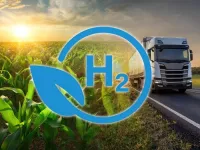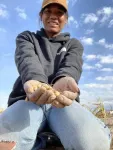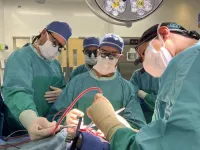(Press-News.org) RICHLAND, Wash.—The Pacific Northwest is set to begin work building out a clean hydrogen economy with today’s announcement of a Phase 1 funding award from the Department of Energy. The $27.5 million award to the Pacific Northwest Hydrogen Association (PNWH2), a multi-state nonprofit organization, will be matched by industry partners up to $125 million in Phase 1 of the project.
DOE’s Pacific Northwest National Laboratory will serve as an advisor to the PNWH2 by conducting life-cycle analysis to predict and understand the planned hydrogen energy infrastructure impact on decreasing emissions and aiding in community engagement.
Public and private groups represented in the PNWH2 Hub are working with leaders in Washington, Oregon and Montana to leverage the region’s renewable energy sources to produce clean hydrogen for the region. If successful, the region could receive up to $1 billion in total DOE funding, which would be supplemented by billions more in industry cost sharing, to build out a clean hydrogen ecosystem.
“We at PNNL join our colleagues at the Pacific Northwest Hydrogen Association in celebrating this important step forward and wish to acknowledge the dedication and hard work that went into reaching this milestone,” said PNNL Director Steven Ashby. “We look forward to collaborating with our government and industry partners to help realize a clean hydrogen ecosystem for the Pacific Northwest and beyond.”
PNNL scientists, engineers and analysts are providing economic, technological and emissions reduction evaluations of hydrogen production, integration with the electrical grid, and end users in the Hub. The goal of the PNWH2 Hub is to develop and market economical clean hydrogen power solutions to meet the United States’ clean energy goal while ensuring that at least 40% of the benefits flow to disadvantaged communities. The hydrogen will be used to address some of the hardest-to-decarbonize technology areas such as public transportation (transit buses), agricultural products (fertilizer), medium- and heavy-duty transportation and the electric power industry.
The PNWH2 Hub joins California as the first two of a planned national network of clean hydrogen producers, consumers and connective infrastructure, while supporting the production, storage, delivery and end-use of clean hydrogen.
Learn more about the PNWH2 Hub and today’s award announcement.
END
Pacific Northwest launches clean hydrogen energy hub
PNNL research team to support technology analysis of hydrogen’s role in the Pacific Northwest energy landscape
2024-07-25
ELSE PRESS RELEASES FROM THIS DATE:
Tiny deletion in heart muscle protein briefly affects embryonic ventricles but has long-term effects on adult atrial fibrillation
2024-07-25
BIRMINGHAM, Ala. – Millions of adults have atrial fibrillation — an irregular beating of the upper chambers of the heart that yields increased risk of heart failure, stroke and death. Many genetic mutations in the developing fetus can lead to adult atrial fibrillation, including mutations that shorten the massive protein titin in cardiac muscle cells.
Now, in a study in zebrafish and human heart muscle cells, researchers show that a tiny deletion in the A-band of titin — the loss of just nine amino acids out of more than 27,000 to 35,000 amino acids of an intact titin protein — causes a developmental ...
Harms of prescribing NSAIDs to high risk groups estimated to cost NHS £31m over 10 years
2024-07-25
Prescribing non-steroidal anti-inflammatory drugs (NSAIDs) to people at high risk of harm from them is estimated to cost the NHS in England around £31 million and cause more than 6,000 lost years of good health over 10 years, finds a study published by The BMJ today.
NSAIDs continue to be a source of avoidable harm and healthcare costs, and more needs to be done to address this, especially in high risk groups, say the researchers.
NSAIDs are used for pain and inflammation and are one of the most widely prescribed groups of medicines in the world, But they are known to increase the risk of gastrointestinal bleeding, heart attacks, stroke, and kidney damage.
Yet ...
Wearing a face mask in public spaces cuts risk of common respiratory symptoms, suggests Norway study
2024-07-25
Wearing a surgical face mask in public spaces reduces the risk of self-reported respiratory symptoms, finds a trial of adults in Norway published by The BMJ today.
The effect was moderate - a 3.2% reduction in symptoms, equivalent to around 3,300 fewer infections per 100,000 people - but the researchers say these results support the claim that face masks may be an effective measure to reduce the rate of self-reported symptoms consistent with respiratory tract infections.
Observational studies suggest that face masks reduce the risk of respiratory tract infections, but findings from randomised ...
Some private biobanks overinflating the value of umbilical cord blood banking in marketing to expectant parents
2024-07-25
Some private UK biobanks may be misleading expectant parents about the value of storing umbilical cord blood to treat life-threatening diseases that may arise in their child in the future, reveals an investigation by The BMJ, published today.
Over the past decade growing numbers of parents have chosen to store blood from the umbilical cord, which contains stem cells, in case their infant develops a condition that could be treated with stem cell therapy.
Parents must use a private biobank which charges around £550 ...
New research in fatty liver disease aims to help with early intervention
2024-07-25
A new study brings researchers closer to better understanding the pathology of the fatty liver disease MASH, which stands for metabolic dysfunction-associated steatohepatitis.
MASH is a consequence of poor diet and obesity and results in severe damage to the liver. In MASH, the liver becomes filled with active and rapidly multiplying T cells, which are a type of immune cell.
In today’s study, published in Hepatology, researchers examine what these T cells look like and how they work in people with liver cirrhosis (a late stage of liver disease) and in an animal ...
Genetics reveal ancient trade routes and path to domestication of the Four Corners potato
2024-07-25
A new study shows that a native potato species was brought to southern Utah by Indigenous people in the distant past, adding to an ever-growing list of culturally significant plant species that pre-contact cultures domesticated in the Southwestern U.S.
The team of researchers, led by Red Butte Garden and the Natural History Museum of Utah (NHMU) at the University of Utah, used genetic analysis to reveal how and where tubers of the Four Corners potato (Solanum jamesii) had been collected, transported and traded throughout the Colorado Plateau. The findings support the assertion that the tuber is a “lost sister,” joining maize, beans and squash—commonly ...
SNIS 2024: New study shows critical improvements in treating rare eye cancer in children
2024-07-25
FOR IMMEDIATE RELEASE: July 24, 2024, 3:20 P.M. MDT
CONTACT: Camille Jewell
cjewell@vancomm.com or 202-248-5460
COLORADO SPRINGS, Colo. — The evolution of retinoblastoma treatment over the past 15 years has resulted in a higher likelihood of vision preservation without compromising survival, according to research released today at the Society of NeuroInterventional Surgery’s (SNIS) 21st Annual Meeting.
Retinoblastoma, a rare eye cancer that affects young children, carries a risk of impaired vision and removal ...
Wearable devices can increase health anxiety. Could they adversely affect health?
2024-07-24
Using a wearable device, such as a smart watch, to track health data and symptoms, is supposed to help people monitor their health and address symptoms as quickly as possible to spur positive health outcomes. But for people with atrial fibrillation, also known as Afib, using a wearable device to monitor the heart rate and to alert wearers of an irregular heartbeat might not be as helpful as wearers think.
A new study in the Journal of the American Heart Association, led by Lindsay Rosman, PhD, assistant professor of medicine in the ...
Addressing wounds of war
2024-07-24
Dr. Olga Denysiuk, MD, PhD, is a highly skilled eye surgeon in Ukraine who now finds herself at the frontlines of ophthalmic trauma care caused by war.
“Every day, I am fighting my war in the operating room,” says Denysiuk. “Cases of eye trauma are mounting and it’s critical that we have surgeons trained to delicately manage eyelid and orbital injuries.”
Denysiuk is one of two ocular specialists selected for a unique humanitarian fellowship at the University of Calgary’s ...
Rice researchers develop innovative battery recycling method
2024-07-24
A research team at Rice University led by James Tour, the T.T. and W.F. Chao Professor of Chemistry and professor of materials science and nanoengineering, is tackling the environmental issue of efficiently recycling lithium ion batteries amid their increasing use.
The team has pioneered a new method to extract purified active materials from battery waste as detailed in the journal Nature Communications on July 24. Their findings have the potential to facilitate the effective separation and recycling of valuable battery materials ...
LAST 30 PRESS RELEASES:
DGIST identifies “magic blueprint” for converting carbon dioxide into resources through atom-level catalyst design
COVID-19 vaccination during pregnancy may help prevent preeclampsia
Menopausal hormone therapy not linked to increased risk of death
Chronic shortage of family doctors in England, reveals BMJ analysis
Booster jabs reduce the risks of COVID-19 deaths, study finds
Screening increases survival rate for stage IV breast cancer by 60%
ACC announces inaugural fellow for the Thad and Gerry Waites Rural Cardiovascular Research Fellowship
University of Oklahoma researchers develop durable hybrid materials for faster radiation detection
Medicaid disenrollment spikes at age 19, study finds
Turning agricultural waste into advanced materials: Review highlights how torrefaction could power a sustainable carbon future
New study warns emerging pollutants in livestock and aquaculture waste may threaten ecosystems and public health
Integrated rice–aquatic farming systems may hold the key to smarter nitrogen use and lower agricultural emissions
Hope for global banana farming in genetic discovery
Mirror image pheromones help beetles swipe right
Prenatal lead exposure related to worse cognitive function in adults
Research alert: Understanding substance use across the full spectrum of sexual identity
Pekingese, Shih Tzu and Staffordshire Bull Terrier among twelve dog breeds at risk of serious breathing condition
Selected dog breeds with most breathing trouble identified in new study
Interplay of class and gender may influence social judgments differently between cultures
Pollen counts can be predicted by machine learning models using meteorological data with more than 80% accuracy even a week ahead, for both grass and birch tree pollen, which could be key in effective
Rewriting our understanding of early hominin dispersal to Eurasia
Rising simultaneous wildfire risk compromises international firefighting efforts
Honey bee "dance floors" can be accurately located with a new method, mapping where in the hive forager bees perform waggle dances to signal the location of pollen and nectar for their nestmates
Exercise and nutritional drinks can reduce the need for care in dementia
Michelson Medical Research Foundation awards $750,000 to rising immunology leaders
SfN announces Early Career Policy Ambassadors Class of 2026
Spiritual practices strongly associated with reduced risk for hazardous alcohol and drug use
Novel vaccine protects against C. diff disease and recurrence
An “electrical” circadian clock balances growth between shoots and roots
Largest study of rare skin cancer in Mexican patients shows its more complex than previously thought
[Press-News.org] Pacific Northwest launches clean hydrogen energy hubPNNL research team to support technology analysis of hydrogen’s role in the Pacific Northwest energy landscape






